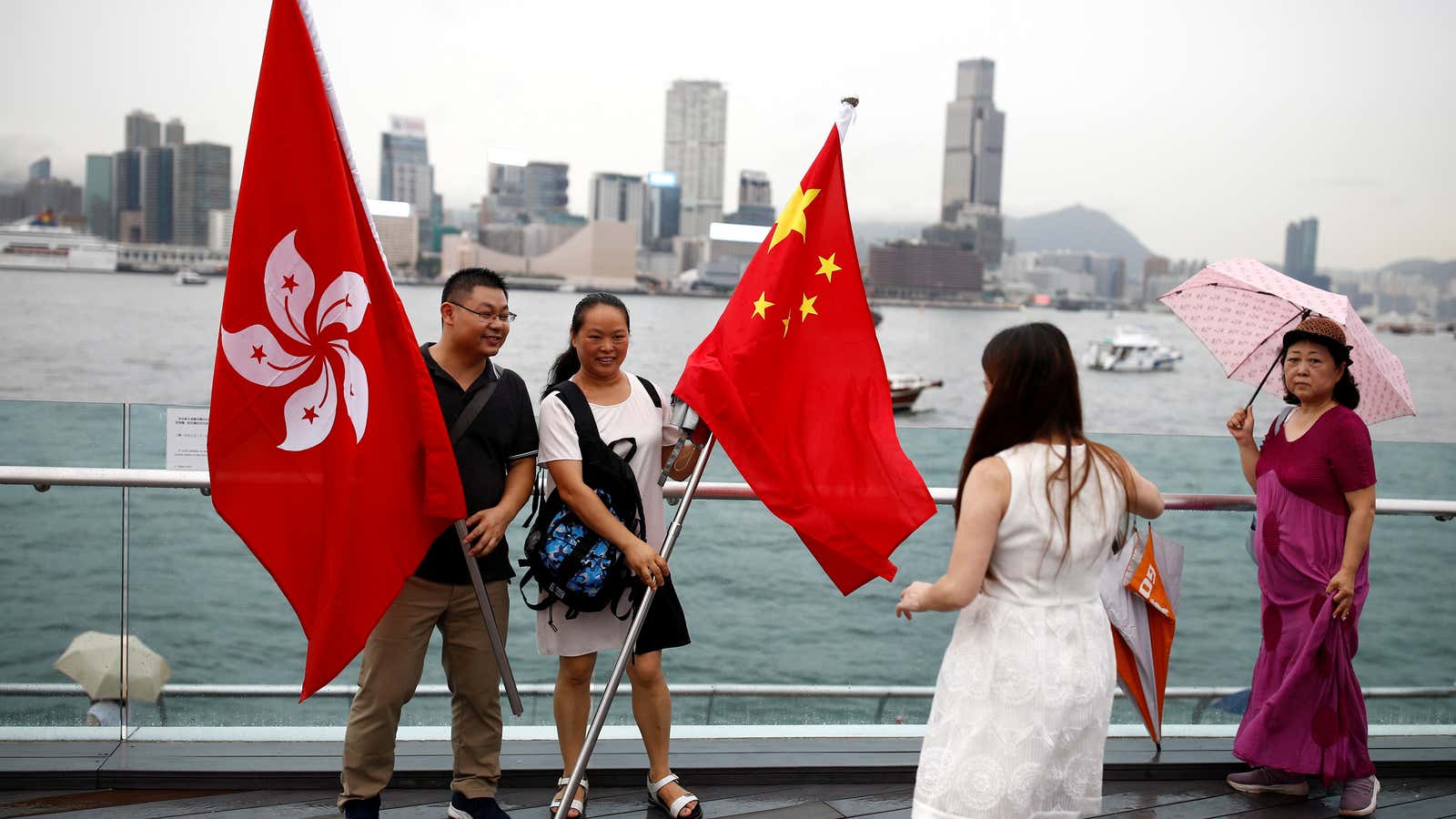C, a mainland Chinese person in their late 20s who lives and works in Hong Kong, was stunned by the response after they shared some words of encouragement for the city’s protesters on their personal Facebook page.
“My post expressed my discomfort at seeing some mainlanders cheering reports that protesters had been beaten up by gangsters during the demonstrations, and I said incidents like this should be thoroughly investigated,” C told Quartz. “The next thing I knew was that a college classmate of mine had taken a screenshot of that post and shared it to a mainland Chinese website.”
Luckily for C, the screenshot was not widely shared and did not cause too much of an impact on C’s daily life. But a mainland Chinese artist who lives outside of the country was less fortunate. The artist, who asked to be identified as “Ren,” received “a wave of hate speech and harassment” from users of various Chinese social media platforms, after one of Ren’s high-school classmates shared Ren’s Facebook post criticising police brutality in Hong Kong. Both C and Ren requested anonymity out of fear for their personal safety.
“Look at this person!” and “Remember this face,” the classmate wrote, attaching Ren’s photo to the screenshot of the post. Ren was labeled as a separatist by the classmate (many mainland Chinese equate the protesters to supporters of Hong Kong independence, in line with the narrative pushed by state propaganda). The classmate also revealed details of Ren’s family, and asked users to figure out where Ren’s parents work.
After being blocked by Ren on all social media platforms, the informant went further, taking Ren’s information to a male influencer with over 100,000 followers on a Chinese social media platform, who shared Ren’s detailed personal information with his fans, leading to another wave of harassment.
Chillingly, a large number of “informants” are, or at least used to be, friends, classmates, or even family members of the victims, according to accounts from multiple people who have been doxxed, as the practice of publishing private information online as a form of retaliation is called. Ren, for example, said they used to bond with the classmate-turned-informer over being “mediocre students” in school, while C also remembered feeling safe in the past voicing opinions to people who studied at the same university.
The growing trend of doxxing among ordinary citizens further restricts the already very narrow space for free speech and dissent not only in China, but even abroad, with mainland Chinese outside the country’s borders also facing intimidation and even physical danger for expressing “dissenting” views. The phenomenon is reminiscent of China’s Cultural Revolution era, the social movement launched by former Communist leader Mao Zedong from 1966 to 1976, where people were encouraged to turn against their friends, classmates, even family members if they expressed views deemed disrespectful of the party.
“For those who have different views from China’s official narrative, censorship from the government is not the only thing they have to be cautious of—now they also face scrutiny from ordinary people,” said Fang Kecheng, an assistant professor in the school of journalism at the Chinese University of Hong Kong. “This means fewer and fewer people will dare to voice their opinions, deepening the gap between different groups.”
The Hong Kong protests, initially against a now-suspended extradition bill that would have allowed its residents to stand trial in mainland China, are now in their 13th week. The movement has since developed to encompass broader demands such as the resignation of the city’s chief executive Carrie Lam, and an independent investigation into alleged police brutality that took place during the demonstrations.
While the protests have drawn millions of Hong Kong people to the streets, with polls showing that the protesters have widespread support (link in Chinese) in the city, propaganda from the Chinese government and affiliated media outlets have promoted the singular view—often through false information—that the protests are overwhelmingly violent with narrow support among Hong Kongers. The official narrative also smears all protesters as advocates of Hong Kong independence. In recent weeks, those views have been amplified in overdrive on Chinese social networks, accompanied by a chorus of local celebrities and foreign companies all proclaiming their support of China’s sovereignty. In reality, a multitude of voices do exist among mainland Chinese on the Hong Kong protests, even if finding them feels like an almost impossible task against the wall of cacophonous nationalism.
The fear of being doxxed has spread far outside mainland China. Hong Kong students at universities around the world who have been staging their own protests in recent weeks, for example, found themselves physically assaulted as well as doxxed by mainland Chinese students. At one such rally at Melbourne’s Monash University this month, a mainland Chinese woman who engaged with the pro-Hong Kong protesters rather than shouting them down was bullied by her compatriots, who threatened to report her to the consulate. Images of her face were then circulated on Chinese social networks, according to an account by Kevin Carrico, an academic teaching at the university.
Even journalists covering the protests haven’t been immune from the doxxing. One user on Twitter recently created a collage of female journalists of Chinese ethnicity who are working for foreign media—including Quartz—suggesting that they “crave” the perceived “high status” that comes with working for Western companies.
In the face of the mounting pressure from both grassroots informers and the government, liberal Chinese youth like Ren have become more inclined to keep quiet and even hide from the outside world. “When I get really upset, I imagine myself leaving my body and watching this whole scene unfold from far, far away,” Ren said. “Then those people appear so small.”
